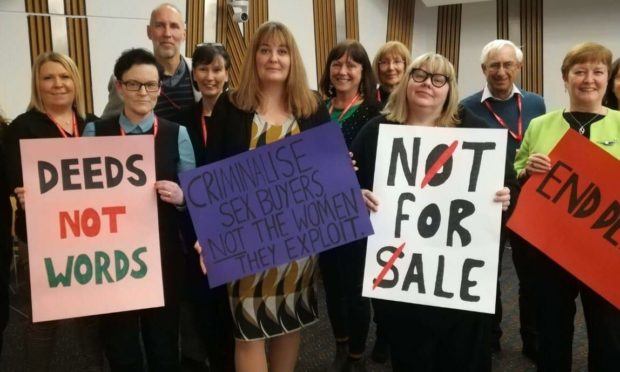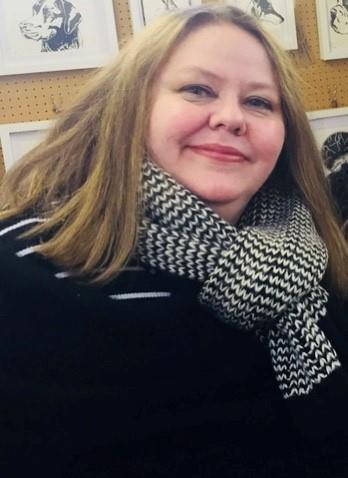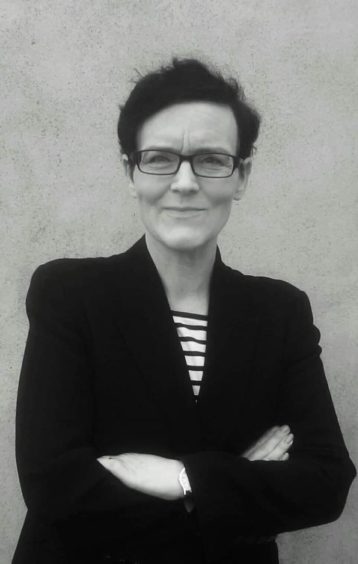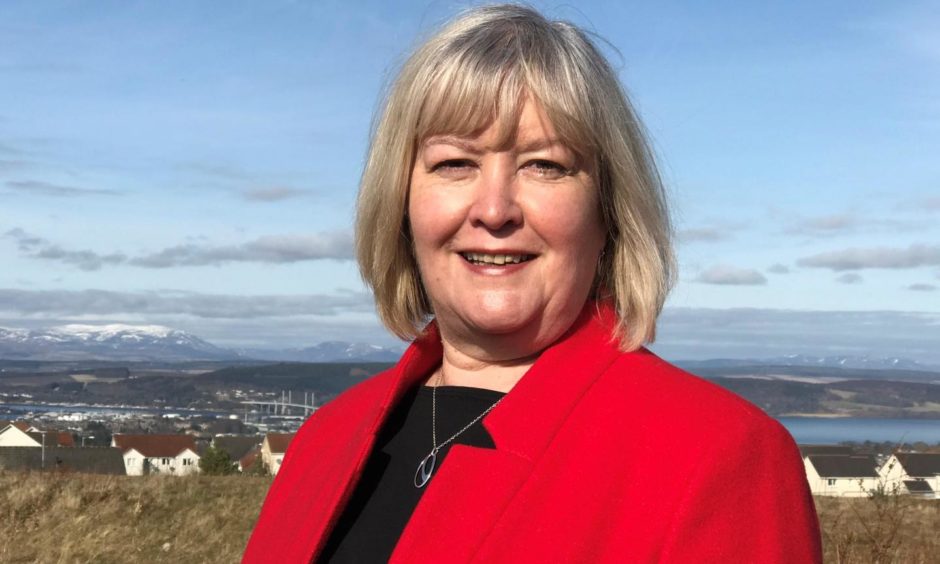A Highland MSP and Dundee sex trafficking survivor are calling for men who pay for sex in Scotland to be criminalised instead of the female victims of sexual exploitation and prostitution.
Diane Martin CBE and Rhoda Grant MSP are helping launch a campaign to overhaul Scotland’s ‘outdated and unjust’ prostitution laws where victims of sexual exploitation are still treated as criminals.
The new campaign, A Model for Scotland, wants to decriminalise women involved in prostitution and instead criminalise the punters – the men who pay for sex.
Campaigners also want the Scottish Government to wipe convictions for solicitation from victims’ criminal records and criminalise online pimping through Adult Service Websites.
A survivor of prostitution and sexual exploitation, Diane found herself trapped in the world after arriving in London as a teenager.
She fell under the control of a madam and was shipped between luxury hotels and apartments in England and trafficked overseas where she was abused by rich, powerful men.
Raped, beaten and held at gunpoint
Diane was raped, beaten and asked at gunpoint if she ever wanted to see her mum again.
She told this publication: “Control doesn’t happen overnight, grooming is a process. I went from being a happy trusting girl to finding myself standing in a penthouse being looked over by a madam.
“I felt lonely and afraid and was always scanning the room and people’s faces hoping they might see behind the facade of what was presented.
“But nobody wanted to see, nobody wanted to know that I didn’t want to be there because what would that say about them?
“The potential of violence always hung in the air, the knowledge that the men were physically stronger than me was an ever-present fear and on many occasions being held down and assaulted became my reality.”
Oppressive system of prostitution
Diane is campaigning for a complete overhaul of the way prostitution is viewed and dealt with in Scotland, and believes criminalising those who pay for sex is an important part of that.
“Unfortunately, the best education and opportunities didn’t preclude these men from degrading and violent behaviour which is intrinsic to the misogynistic and oppressive system of prostitution.
“The sense of entitlement some men believe they are afforded if they pay crosses every section of society.
“Ridiculously described as ‘high class’- I was sent out by what was described as the safest agency in London.
“There is nothing high class about being raped, bitten or asked at gunpoint if you want to see your mum again.”
Diane managed to escape the world of sexual exploitation and has spent the last 25 years helping other victims.
In that time she says much has changed, but much has also stayed the same.
She said: “The same misogynistic mindset where some men believe they are entitled to rent women’s bodies and ‘buy’ consent still exists.
“The abuse and violence experienced by women and children trapped in prostitution also remains the same.”
Online pimping
Technology is one of the main avenues to have changed, with online pimping websites now a major concern.
“Online you can rent a human being as easily as you can buy a pizza,” said Diane.
“The influence and access to pornography continues to shape the mindset of boys and men around sexuality and power with negative consequences for women and girls.
“Sex buyers ensure that the demand for prostitution has increased and that demand is met by traffickers and pimps who are more than happy to provide a never-ending supply of ‘products’ for consumption, as they rake in millions of pounds.”
The survivor believes it is an important part of A Model for Scotland that legislation is introduced to bring legal consequences against the third party profiteers who run the online pimping websites.
The Nordic Model
Diane looks to Sweden where the Nordic Model has been in place for over 20 years as a guide to how attitudes can change if the criminalisation of prostitution is shifted from the female to the buyer.
She said: “(In Sweden) the culture shift has been remarkable.
“Among the generations that have grown up with this approach the thought of paying for sex is anathema and considered socially unacceptable and year on year public support for addressing prostitution in this way grows.
“Additionally, because Sweden is a hostile environment for prostitution, it is also less attractive to organised crime groups.”
A Model for Scotland has the backing of Highlands and Islands Labour MSP Rhoda Grant and SNP MSP Ruth Maguire who co-convene the Scottish Parliament’s Cross-Party Group on Commercial Sexual Exploitation.
Fellow survivor Mia de Faoite and TARA, an organisation which supports women who have been trafficked for sexual exploitation, are, among others, also backing the change in legislation.
Similar laws, known as the Nordic Model, are already in place across countries like Sweden, Norway, Iceland, Ireland and France.
‘I experienced a gang-rape’
Mia de Faoite, from Dublin, knows first-hand the horrors and violence of the prostitution world, suffering rape and seeing her friends die.
She fell into the world through heroin addiction in her thirties but believed she would be able to exit after a few months. Three months became six years.
“It’s a violent, dangerous place,” Mia told this publication.
“In those six years I experienced a gang-rape. Seven men, there was eight there but one didn’t touch us.
“My friend, the girl who was with me, she didn’t survive. She died a few weeks later of an overdose.
“I always say that it might have been heroin in her arm the day she died but I know it was that night that killed her.”
That night in December 2005 changed everything for Mia.
Her heroin intake increased to numb the effects of what she had experienced and she began to view Lucy, who she was at night, as different to Mia.
“I thought I was going mad, but really it was just a safety, psychological thing.
“I stayed off the street for about three weeks – but then you go back.”
In her time on the street Mia was raped three more times, suffered “countless” assaults and oral-rape. A second friend died.
Another friend from Africa had been trafficked.
She was trapped in the oppressive world of prostitution and viewed as a criminal by those outside it.
Ireland changed its laws to decriminalise females but punish the men who pay for sex four years ago.
“There’s been positive results,” said Mia, “Women, because they’re decriminalised, are coming forward to report violence and rape and assault.
“Intelligence, relationships and trust in the police is building.”
The survivor believes it is also important to criminalise the punter – rather than just decriminalise prostitution over all – as others have called for.
‘An industry where rape and abuse thrive’
She believes the men who raped her would no longer “take the risk” in Ireland with the change in attitudes towards who the criminal is.
“There’s pimps and traffickers, but I was never raped by a pimp or a trafficker, I was only ever raped by a sex-buyer – whether he initially intended to or not,” explained Mia.
“It is an industry where rape and abuse thrive.
“There isn’t another industry where that level of violence would be tolerated.
“Consent can’t be purchased, no matter what.”
Mia accepts there are women who want to work in the sex industry by choice but claims this is an extremely small minority compared to those who are being sexually exploited.
“This law is about the 80-90% of women, who given any other choice, would not be there. Being beaten, raped and murdered. This law is about them,” said Mia.
“It isn’t young Parisian university students that are in Glasgow and Edinburgh and Dundee being sold, it’s not.
“It’s from the disadvantaged areas of Eastern Europe. Why?
“The little girls in Romania are dreaming the same dreams as my nine-year-old granddaughter. They want to be teachers, nurses, doctors, pop-stars.
“They have the same dreams. And we should be supporting our poorer European countries and not stripping their daughters of every piece of dignity they have.
“We have no right to do that.”
‘Stuck in the dark ages’
Scotland already recognises prostitution as violence against women, campaigners believe it is now time for legislation to catch up with policy.
Rhoda Grant, Labour Highlands and Islands MSP, claimed Scotland’s prostitution laws are still “stuck in the dark ages.”
She told this publication: “It’s long overdue. This is not a new issue, it’s an issue we’ve been aware of for a long time.
“Currently in Scotland, if you are being sexually exploited for commercial reasons you are the one that is most likely to end up with a criminal record.
“Whereas the people that feed that industry, the punters and pimps, get off pretty much Scot free.
“As a country we recognise that prostitution is commercial sexual exploitation and is a form of violence against women, that’s been recognised for a long time, yet we’ve done absolutely nothing about it.”
The MSP believes the changes in legislation will help counteract the demand for prostitution which drives sexual exploitation.
A Model for Scotland campaign will be launched online on Monday at 11am. Register here at https://amodelforscotland.eventbrite.co.uk



